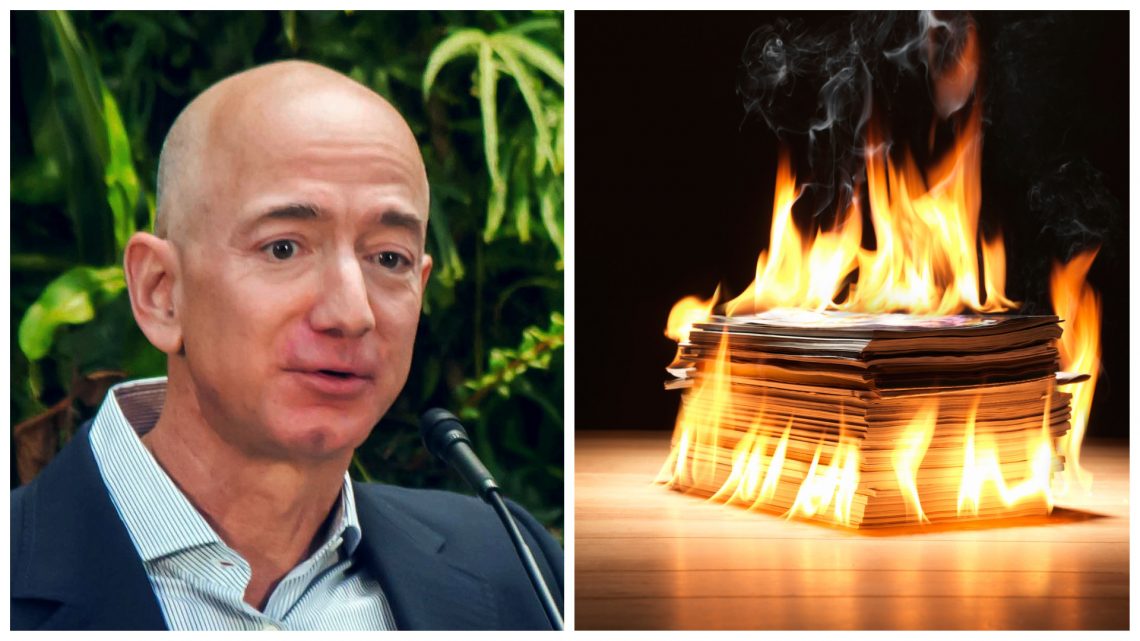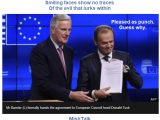
Instead of Giving Billions to Amazon, We Could Just Cancel Student Debt
November 16, 2018On Tuesday, Amazon confirmed it would build new offices in Long Island City, Queens, and a suburb of Washington, DC, called Crystal City, ending a massive bidding war that saw the leaders of almost 250 cities prostrate themselves at the feet of the world's richest man.
Thirsty officials mailed Amazon a giant cactus and lit up local landmarks in "Amazon orange" in hopes of hosting what was billed as the retail giant's "second HQ," despite the fact that it is definitionally impossible for there to be more than one headquarters of anything. Somehow more humiliatingly, Governor Andrew Cuomo said he'd literally change his name to "Amazon" for the privilege of helping gift the mega company at least a billion in tax subsidies. All of this would have been sort-of hilarious if it didn't throw CEO Jeff Bezos's power over the country's ostensible leaders into such terrifying relief. What's more, it's depressing that so much effort went into making something happen that probably would have happened regardless, and will likely just cause rents to rise in a city that already struggles with housing costs.
"This was a company that was going to grow and almost certainly going to expand to these regions," Stacy Mitchell, co-director of the Institute for Local Self-Reliance, an economic think-tank that has researched the pernicious social and economic effects of Amazon's dangerous monopoly, told me. "They don't need a subsidy at all. And it's ridiculous and shocking that Bill de Blasio, who ran on a platform of fixing economic inequality, worked so hard to bring in a project that's going to cause a lot of hardship for working-class New Yorkers."
But right after the announcement about the so-called HQ2 came down, New York State Assembly Member Ron Kim made an announcement of his own: he'd be introducing legislation to take the money Cuomo and other officials promised and use it to cancel some of the over $80 billion in debt bogging down the state's student borrowers.
"Giving Jeff Bezos hundreds of millions of dollars is an immoral waste of taxpayers money when it's more than clear that the money would create more jobs and more economic growth when it is used to relieve student debt," Kim said in an emailed press release. "Giving Amazon this type of corporate welfare is no different, if not worse, than Donald Trump giving trillions in corporate tax breaks at the federal level. There's no correlation between healthy, sustainable job creation and corporate giveaways. If we used this money to cancel distressed student debt instead, there would be immediate positive GDP growth, job creation, and impactful social-economic returns."
Mitchell at the Institute for Local Self-Reliance agreed there were a litany of ways in which that money could be put to better use, like providing property tax rebates to local businesses and addressing the shortage of capital available to would-be business owners. Kim, for his part, pointed to a recent study from Bard College that suggested canceling student debt might produce a significant increase in real GDP, could add between $86 billion and $108 billion per year to the economy on average, and would lead to the all-important holy grail of job creation.
The idea that the government could help regular people and boost the economy by wiping out debt isn't a brand new one. After the 2008 financial crisis, a Cornell Law professor named Robert Hockett advocated for municipalities to help borrowers by using their powers of eminent domain to buy up and restructure underwater mortgages. A number of cities including Richmond, California, latched onto the idea, but the plan to implement it was paused after Deutsche Bank, Wells Fargo, and other major financial players challenged it in court. By the time that suit was dismissed, the novel scheme had started to lose momentum.
Still, Hockett told me the same general concept could be applied to student debt. Each state would have to pass laws to make sure debt was clearly considered property—that is, something the government can claim domain over—if it wasn't already. Then they would have to create an agency or state-backed entity to take care of buying up and canceling the debts. Foundations and other benevolent organizations would help foot the cost to the cities.
"I think the case is fairly strong here," he said. "Not quite as strong in the case of the mortgage crisis, but it's pretty close. We have the data to show that when we have lots of young folk entering the workforce underwater, they tend to delay house-buying and family formation and starting their own business and seeking employment that will be more remunerative in the long run because they're just trying to say afloat. When the people who are affected are more concentrated in a specific area code, a strong argument can be made to purchase the debt and write it down, or lower the interest rate and lower the level of burden.
Of course, the apparent economic benefits of the student-loan scheme will only matter if the powers that be are ready to be rational. This may not be the case. After all, there's a growing consensus that wooing big businesses is not the best way to bolster a local economy, and Mitchell with the Institute for Local Self-Reliance said New York's Amazon pitch had less to do with the company's massive propaganda arm than the way politicians' psychology had evolved in recent decades to think their jobs were about encouraging development at all costs.
But given the number of options available to New Yorkers who want to resist development, the Amazon deal is far from set in stone. Just hours after it was announced, a New York state senator and city council member began mobilizing a rally at the proposed site. And Hockett told me he was working with Kim, the local lawmaker, to hammer out the details on how New York State could take that Amazon money and use it to help normal people live their lives.
"We've been planning this since well before the Amazon announcement, but now that that's been made, we're [going to] point to that, too, because it shows the state is able to help some people out," Hockett said. "So why not the people who are actually hurting because of debt burdens?"
Sign up for our newsletter to get the best of VICE delivered to your inbox daily.
Follow Allie Conti on Twitter.


